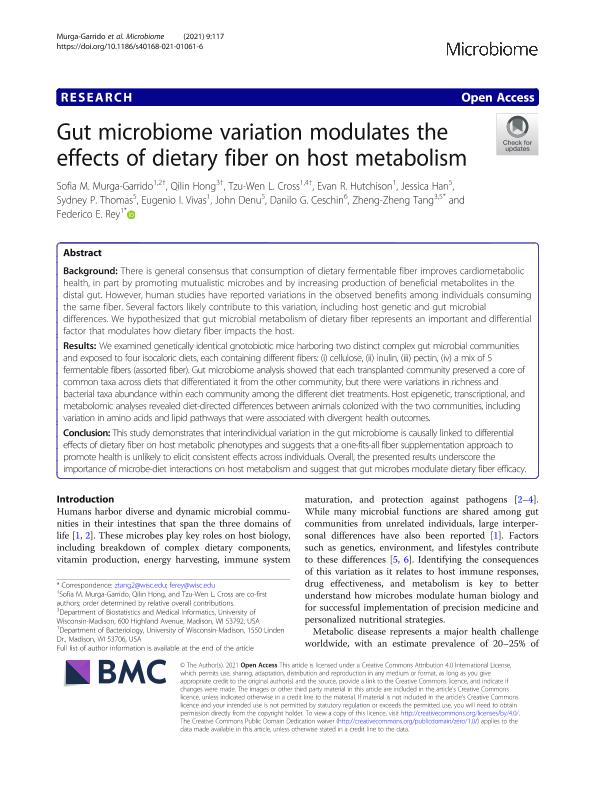Mostrar el registro sencillo del ítem
dc.contributor.author
Murga Garrido, Sofia M.
dc.contributor.author
Hong, Qilin
dc.contributor.author
Cross, Tzu Wen L.
dc.contributor.author
Hutchison, Evan R.
dc.contributor.author
Han, Jessica
dc.contributor.author
Thomas, Sydney P.
dc.contributor.author
Vivas, Eugenio I.
dc.contributor.author
Denu, John
dc.contributor.author
Ceschin, Danilo Guillermo

dc.contributor.author
Tang, Zheng Zheng
dc.contributor.author
Rey, Federico E.
dc.date.available
2023-01-05T15:34:47Z
dc.date.issued
2021-12
dc.identifier.citation
Murga Garrido, Sofia M.; Hong, Qilin; Cross, Tzu Wen L.; Hutchison, Evan R.; Han, Jessica; et al.; Gut microbiome variation modulates the effects of dietary fiber on host metabolism; BioMed Central; Microbiome; 9; 1; 12-2021; 1-26
dc.identifier.issn
2049-2618
dc.identifier.uri
http://hdl.handle.net/11336/183543
dc.description.abstract
Background: There is general consensus that consumption of dietary fermentable fiber improves cardiometabolic health, in part by promoting mutualistic microbes and by increasing production of beneficial metabolites in the distal gut. However, human studies have reported variations in the observed benefits among individuals consuming the same fiber. Several factors likely contribute to this variation, including host genetic and gut microbial differences. We hypothesized that gut microbial metabolism of dietary fiber represents an important and differential factor that modulates how dietary fiber impacts the host. Results: We examined genetically identical gnotobiotic mice harboring two distinct complex gut microbial communities and exposed to four isocaloric diets, each containing different fibers: (i) cellulose, (ii) inulin, (iii) pectin, (iv) a mix of 5 fermentable fibers (assorted fiber). Gut microbiome analysis showed that each transplanted community preserved a core of common taxa across diets that differentiated it from the other community, but there were variations in richness and bacterial taxa abundance within each community among the different diet treatments. Host epigenetic, transcriptional, and metabolomic analyses revealed diet-directed differences between animals colonized with the two communities, including variation in amino acids and lipid pathways that were associated with divergent health outcomes. Conclusion: This study demonstrates that interindividual variation in the gut microbiome is causally linked to differential effects of dietary fiber on host metabolic phenotypes and suggests that a one-fits-all fiber supplementation approach to promote health is unlikely to elicit consistent effects across individuals. Overall, the presented results underscore the importance of microbe-diet interactions on host metabolism and suggest that gut microbes modulate dietary fiber efficacy. [MediaObject not available: see fulltext.]
dc.format
application/pdf
dc.language.iso
eng
dc.publisher
BioMed Central

dc.rights
info:eu-repo/semantics/openAccess
dc.rights.uri
https://creativecommons.org/licenses/by/2.5/ar/
dc.subject
GENERAL CONSENSUS
dc.subject
CARDIOMETABOLIC HEALTH
dc.subject
GNOTOBIOTIC MICE HARBORING
dc.subject.classification
Nutrición, Dietética

dc.subject.classification
Ciencias de la Salud

dc.subject.classification
CIENCIAS MÉDICAS Y DE LA SALUD

dc.title
Gut microbiome variation modulates the effects of dietary fiber on host metabolism
dc.type
info:eu-repo/semantics/article
dc.type
info:ar-repo/semantics/artículo
dc.type
info:eu-repo/semantics/publishedVersion
dc.date.updated
2022-08-30T14:30:04Z
dc.journal.volume
9
dc.journal.number
1
dc.journal.pagination
1-26
dc.journal.pais
Reino Unido

dc.journal.ciudad
Londres
dc.description.fil
Fil: Murga Garrido, Sofia M.. Universidad Nacional Autónoma de México; México. University of Wisconsin; Estados Unidos
dc.description.fil
Fil: Hong, Qilin. University of Wisconsin; Estados Unidos
dc.description.fil
Fil: Cross, Tzu Wen L.. University of Wisconsin; Estados Unidos. Purdue University; Estados Unidos
dc.description.fil
Fil: Hutchison, Evan R.. University of Wisconsin; Estados Unidos
dc.description.fil
Fil: Han, Jessica. Wisconsin Institute for Discovery; Estados Unidos
dc.description.fil
Fil: Thomas, Sydney P.. Wisconsin Institute for Discovery; Estados Unidos
dc.description.fil
Fil: Vivas, Eugenio I.. University of Wisconsin; Estados Unidos
dc.description.fil
Fil: Denu, John. Wisconsin Institute for Discovery; Estados Unidos
dc.description.fil
Fil: Ceschin, Danilo Guillermo. Consejo Nacional de Investigaciones Científicas y Técnicas. Centro Científico Tecnológico Conicet - Córdoba. Instituto de Investigación Médica Mercedes y Martín Ferreyra. Universidad Nacional de Córdoba. Instituto de Investigación Médica Mercedes y Martín Ferreyra; Argentina. Instituto Universitario de Ciencias Biomédicas de Córdoba; Argentina
dc.description.fil
Fil: Tang, Zheng Zheng. University of Wisconsin; Estados Unidos. Wisconsin Institute for Discovery; Estados Unidos
dc.description.fil
Fil: Rey, Federico E.. University of Wisconsin; Estados Unidos
dc.journal.title
Microbiome
dc.relation.alternativeid
info:eu-repo/semantics/altIdentifier/doi/https://doi.org/10.1186/s40168-021-01061-6
dc.relation.alternativeid
info:eu-repo/semantics/altIdentifier/url/https://microbiomejournal.biomedcentral.com/articles/10.1186/s40168-021-01061-6
Archivos asociados
